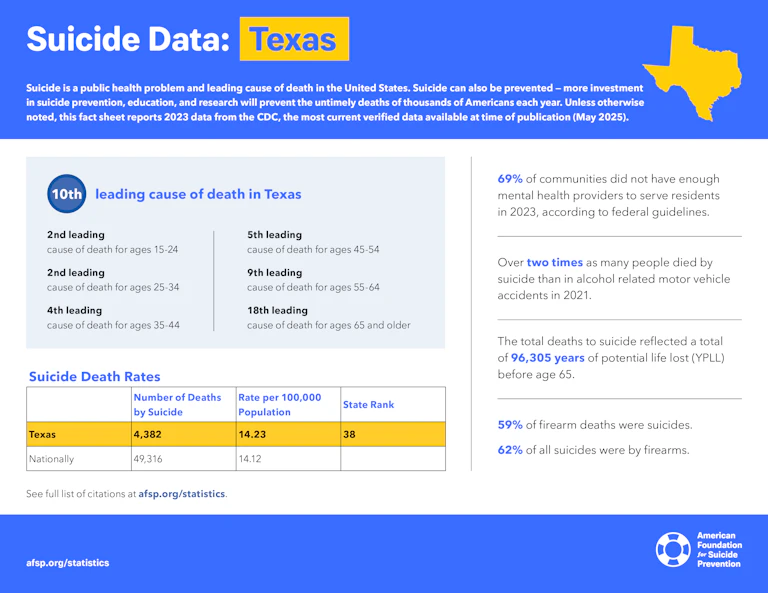Texas

Texas suicide prevention plans and initiatives
Texas’ suicide prevention activities are housed within the state’s Health and Human Services Commission’s (HHSC) Office of Mental Health Coordination in partnership with the Texas Suicide Prevention Collaborative, a broad-based membership group of statewide agencies and organizations, local university campuses, military and Veteran groups, community suicide prevention coalitions, and many other stakeholders across the state working to reduce suicides in Texas. The Collaborative, with support from HHSC, oversees updates to and implementation of the Texas State Plan for Suicide Prevention: Guidelines for Suicide Prevention in Texas, most recently updated in 2022.
In 2003, Texas Health and Safety Code 533.040(c) created a school suicide prevention liaison, followed by a bill in 2015 to increase the visibility and focus of the liaison, and making the position the state’s suicide prevention coordinator. This position now serves as the suicide prevention team lead, which includes a Zero Suicide Safer Care coordinator, a suicide prevention specialist focused on K-12 behavioral health coordination and suicide prevention, an epidemiologist/suicide prevention policy, programs, and outcomes specialist, and a Veteran mental health and suicide prevention coordinator.
Texas laws
Key:
- Required by law
- Encouraged by law
- No law in place
Crisis lines and 988 implementation
- Addresses 988 infrastructure and provides for telecom user fee
- Addresses 988 infrastructure but does not include telecom user fee
- 988 law limited to creating an exploratory commission, advisory committee, or task force
Mental health parity
- Public health plans (e.g., Medicaid) regularly submit parity compliance analyses to state regulators
1 - Private health plans (individual and group) regularly submit parity compliance analyses to state regulators
K – 12 school suicide prevention
- Inclusion of the 988 Suicide & Crisis Lifeline and/or other crisis line(s) on student ID cards
- Student allowances for excused mental health absences
- School personnel must report student suicide risk to a parent and/or guardian
- Suicide prevention and/or mental health training for certain school personnel, annual
- Suicide prevention and/or mental health training for certain school personnel, not annual
- Suicide prevention, intervention, and postvention policies/programming
- Student education on suicide prevention
- Student education on mental health
Health professional training in suicide assessment, treatment and management
- Mental health professionals receive regular training
- Mental health professionals receive one time training
- Medical/surgical professionals receive regular training
- Medical/surgical professionals receive one time training
Conversion therapy bans
- Prohibits licensed/board certified mental health providers from engaging in conversion therapy with minors under 18 years of age
- Prohibits licensed/board certified mental health providers from engaging in conversion therapy with vulnerable adults
- Prohibits use of state funds for any purpose related to conversion therapy (e.g., conducting, making a referral for, or extending health benefits coverage for)
University and college campus suicide prevention
- Inclusion of the 988 Suicide & Crisis Lifeline and/or other crisis line(s) on student ID cards
- Students receive information on available mental health and/or suicide prevention services and/or resources
- Adoption of suicide prevention/awareness policy or program
Firearms
- Process for extreme risk protection orders (ERPOs)
- State voluntary do not sell list